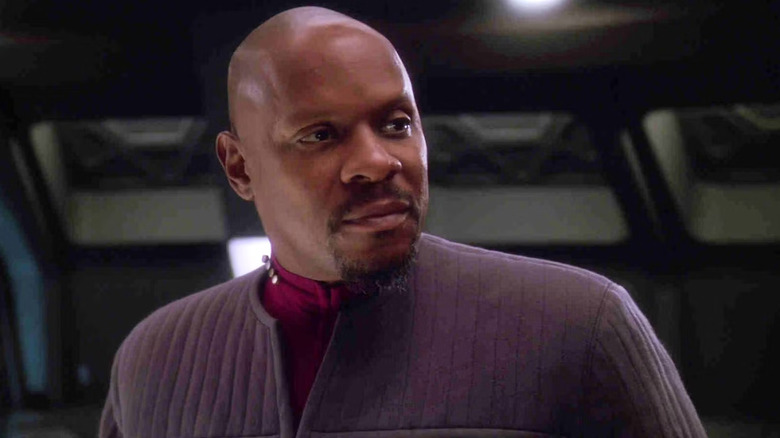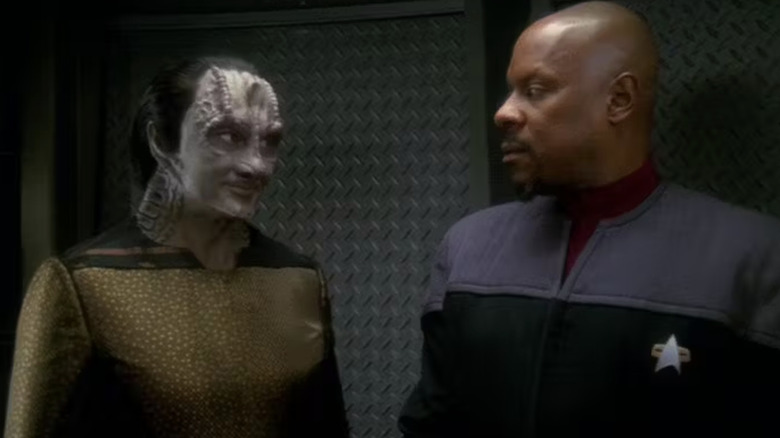How Star Trek DS9 Twisted U.S. History To Create One Of Its Most Controversial Episodes
"Star Trek: Deep Space Nine" was the first serialized "Trek" series and remains the one most willing to break with the franchise's utopian vision. As Captain Ben Sisko (Avery Brooks) muses, "It's easy to be a saint in paradise," but "DS9" puts its characters in tough spots with no easy solutions.
The greatest example is season 6, episode 19 — "In The Pale Moonlight." If you haven't seen it, go watch it now (streaming on Paramount+), experience its brilliance unspoiled, and then report back here.
It's the height of the Dominion War and the Federation-Klingon Alliance is losing. If the Dominion is to be defeated, the good guys will need help from the other major power in the galaxy's Alpha Quadrant: the Romulans, who have thus far remained neutral.
So, Sisko enlists Garak (Andrew Robinson), a Cardassian former spy, for espionage help. The plan quickly changes from Garak digging up dirt to him and Sisko manufacturing falsified evidence that the Dominion is going to invade Romulus; Garak recruits, and then murders, the forger Grathon Tolar to build a holographic recording. Sisko then invites Romulan Senator Vreenak (Stephen McHattie), on his way back from a diplomatic mission to the Dominion, to view this evidence.
Vreenak isn't fooled — but then on his way back home, his shuttle explodes. Unbeknownst to Sisko, this was Garak's plan all along. Kill Vreenak, then the Romulans will discover the recording in the shuttle debris. With the forgery's imperfections masked as explosion damage and the Dominion as the obvious culprits of Vreenak's murder, the Romulans enter the war. The cost was, as Garak tells an angered Sisko, "The life of one Romulan senator, one criminal, and the self-respect of one Starfleet officer."
Amazingly, this espionage plot had its roots in World War I.
The Zimmermann Telegram, by way of Deep Space Nine
The Hollywood Reporter published an oral history of "In The Pale Moonlight" in 2023 for the episode's 25th anniversary. The piece features interviews with episode writers Michael Taylor and Ronald D. Moore (Taylor is the episode's sole credited writer, but Moore made substantial revisions to his script).
According to Taylor, the idea came from the Zimmermann telegram: in January 1917, the German Foreign Office sent a message to Mexico proposing an alliance should the U.S. enter World War I on the side of the Allied Powers. The note is named for the then-German State Secretary for Foreign Affairs, Arthur Zimmermann.
The message was intercepted by British intelligence and made public. In the end, it accomplished the opposite of what Germany wanted: the U.S. joined the Allied Powers in April, and Germany fell alongside the other Central Powers by the following year.
Taylor's idea was to take this episode of real history and add a sinister twist: "What if this message was faked to get us [America] into the war? What if Sisko did something similar and was behind a concocted forgery?" In this analogy, the Romulans would be the U.S. (the neutral sleeping giant), the Dominion would be Germany (the would-be conquerors), and the Federation would be the British (the "discoverers" of the message who need a new ally).
Moore turned the episode from Sisko's son Jake (Cirroc Lofton) investigating his father's actions into its current form, following Sisko Sr. in his moral descent. He suggested to the Hollywood Reporter that an episode this dark got past the powers that be because producer Rick Berman was more focused on "Star Trek: Voyager" than on "DS9."
Sometimes, it pays to not be the flagship.

